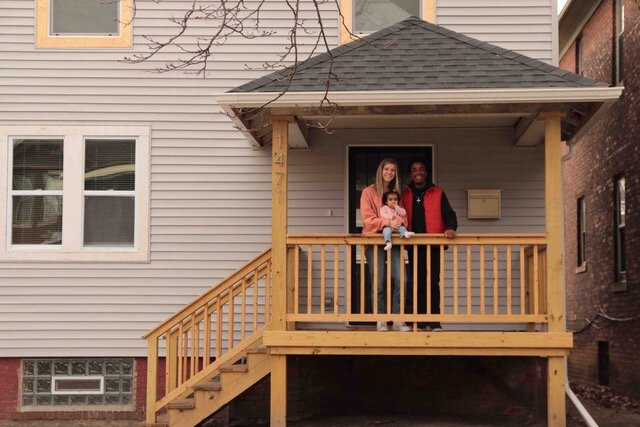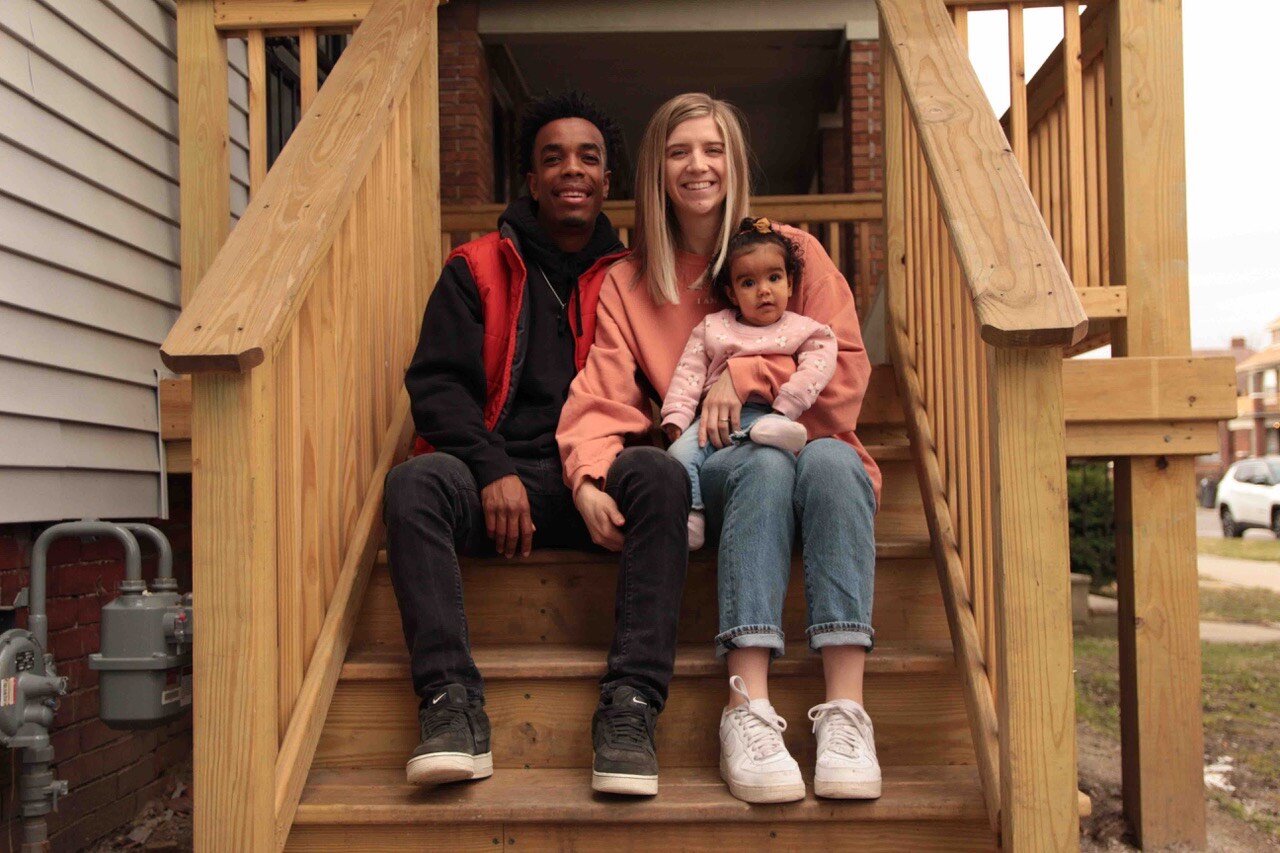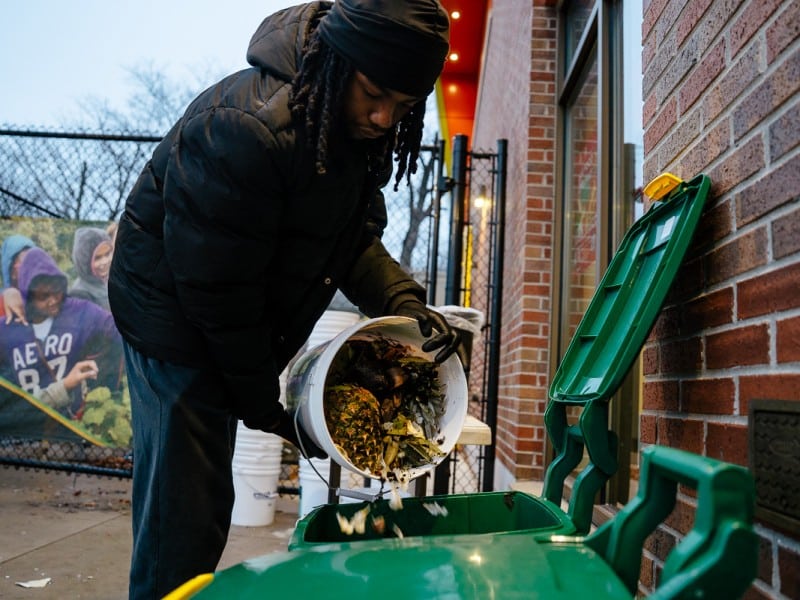Resilient Neighborhoods: ‘It’s a privilege to be able to live here.’
Meeting the challenges and complexity of affordable housing one unit at a time takes patience, financial support and commitment from community development organizations. Read about one young family’s opportunity to enter Detroit’s housing market in a neighborhood they love.
It’s been just two months since the Williams’ family moved into their new house in the Virginia Park neighborhood of Detroit, west of the John C Lodge Freeway, but it already feels like home.
The couple, Megan, 22, and Micah, 24, work in the neighborhood leading the youth program at Central Detroit Christian Community Development Corporation, the organization that presented the opportunity for the couple to buy the renovated house on Euclid St. for an affordable price.
They lived nearby in a one-bedroom rental, but knew they needed more room with their new baby, Maliyah, who is now nine months old.
“To be a part of and live next to the people that we’re serving and working with is super special,” says Megan Williams. “We love being in the neighborhood with the students that we work with. We love being next to our coworkers that live here. Deep down, we really believe there’s something special happening in this neighborhood.”
And there is.
The Williams’ home is one of three dozen vacant housing units across five blocks of Euclid St. that have been purchased and are being renovated by Central Detroit Christian and 360 Detroit, Inc. through a program called Rebuilding Home Together. Each organization owns a total of 18 units, and they are committed to working together to get residents into the homes. Some will be sold; others rented by the organizations.
Phase one includes eight total units, four owned by each organization; the funds for the work came from traditional construction financing, says Lisa Johanon, executive director and housing director of Central Detroit Christian, because they are being sold: “We’ll get the money out that we put in, less some of the grant money we’ve gotten to help keep the [purchase] cost low so it can be affordable housing.”
The cost for renovations of the first four Central Detroit Christian’s homes: $500,000.
The second phase of rehabs, with 20 units, is being funded through grant money from MI State Housing Development Authority (MSHDA), a three percent loan from Detroit Housing for the Future, and philanthropic support from the Gilbert Family Foundation.
Phase three involves the final eight units, and the organizations still need to raise money for those. The extra challenge of the work is to make the housing affordable, “because that’s what our community is and that’s who needs it,” says Johanon.
Central Detroit Christian works primarily in Piety Hill within the 48202 zip code; the Rebuilding Home Together Euclid St. project is in nearby Virginia Park in the 48206 zip code. Both communities are on the cusp of gentrification, and Johanon has already seen folks who have been displaced when landlords sell buildings and tenant rent doubles.
“What do they [residents] do? They leave. We don’t want good neighbors leaving. We had enough of that happen. This [project] is an answer to that,” she says.
Megan Williams doesn’t want her neighbors leaving either.
“We just talked with a neighbor that has been here for almost 60 years now in the same house,” says Williams. “You have a lot of wisdom from elders who have been here for a long time and have seen the neighborhood change over the years.”
She says there are also young children and school-aged children growing up in the neighborhood. There is potential for the next generation to learn from the older generation, “bringing in the new wisdom of the youth – not just doing things the exact same, but still being able to work together to create a better community.”
The Rebuilding Home Together project in Virginia Park and other Detroit neighborhoods is giving homeownership opportunities to Black and Brown residents and other lower-income residents who have not been given homeownership opportunities in the past. “We are building wealth for families, for households,” notes Johanon. “It’s phenomenal.”
Affordable housing, as defined by the U.S. Department of Housing and Urban Development (HUD), is based on the area median income or AMI. But there is a problem with this formula when it comes to Detroit.
Detroit’s AMI, determined by the Detroit-Warren-Livonia metropolitan area, is around $75,000 for a two-person household, says Johanon, and HUD estimates the median family income for the metro area for 2023 at $94,700. Using these numbers to compute what’s affordable in Detroit doesn’t make sense as the income levels are distorted by wealthier outlying suburban communities. To counter that, Central Detroit Christian targets working people who earn between 40 and 60 percent AMI for its homeownership and rental programs.
“They’re the working poor,” says Johanon. “They’re the person who’s working for $15 an hour at McDonald’s or White Castle, or they’re working in housekeeping, or they’re working as a valet parker – all of those good, solid jobs. They need quality, affordable housing, and so our rent range is going to be between $800 and $1,000 per month.”
While providing affordable housing is careful calculation for Johanon, it translates into a rare opportunity for young people, like the Williams.
“Affordable housing gives an incredible opportunity for people who often don’t have those opportunities,” says Williams. “It gives them a sense of ownership of the house or pride in what they own, a space that they can call their own. That’s a really special thing for my husband and me. If it wasn’t for CDC and the deal on this house, we would not be able to have afforded it.”
Williams says it’s the same for many others in their neighborhood. Without affordable opportunities, having a nice place to rent or buy is out of range.
While having affordable housing available – like the 36 units being renovated along Euclid St. – remedies part of Detroit’s housing problems, it’s not the entire solution. Even some of city’s hardest working individuals and families don’t qualify for affordable housing.
“The complexity of affordable housing is incredible,” says Johanon. “Just because people want it doesn’t mean they qualify. If you have bad credit or no credit, or if your credit score is in the 500s and it has to be 620 for the bank, it’s a long process to clean up your credit. That’s a challenge for folks.”
Knowing this, Central Detroit Christian has a housing counseling department that works with people to get them ready to purchase or renovate a home.
Education and opportunity are needed create change, and that’s what’s happening on Euclid St. as vacant houses in disrepair become homes for people who love the city and want stability.
Says Williams, “To be able to be at this stage in our life and own a home, I would’ve never thought that would’ve been the plan for me. We really love the neighborhood. It truly feels like a privilege to be able to live here.”
Resilient Neighborhoods is a reporting and engagement series examining how Detroit residents and community development organizations work together to strengthen local neighborhoods. It’s made possible with funding from The Kresge Foundation.







